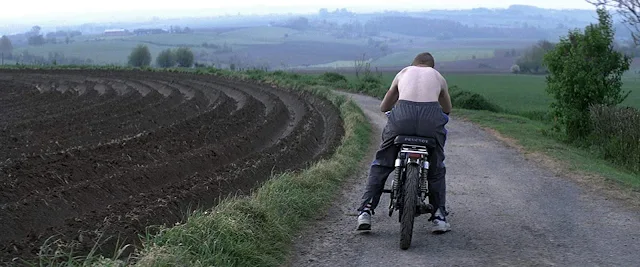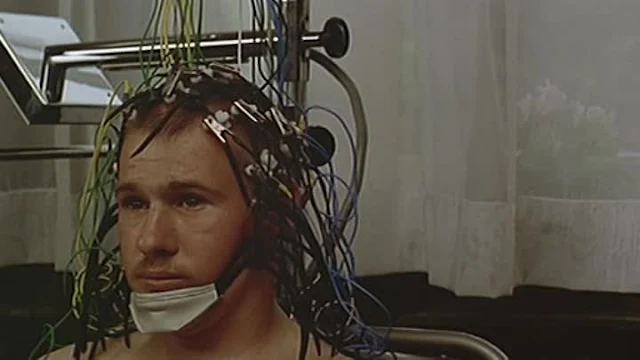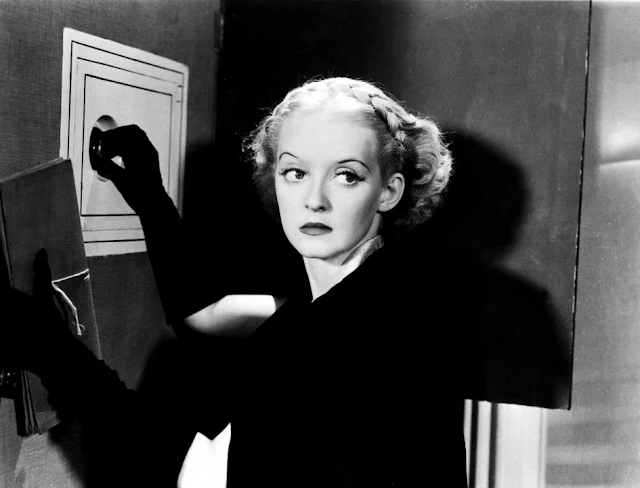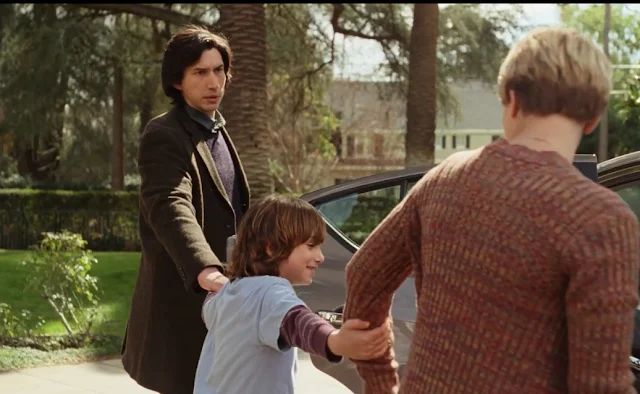A blog formerly known as Bookishness / By Charles Matthews
"Dazzled by so many and such marvelous inventions, the people of Macondo ... became indignant over the living images that the prosperous merchant Bruno Crespi projected in the theater with the lion-head ticket windows, for a character who had died and was buried in one film and for whose misfortune tears had been shed would reappear alive and transformed into an Arab in the next one. The audience, who had paid two cents apiece to share the difficulties of the actors, would not tolerate that outlandish fraud and they broke up the seats. The mayor, at the urging of Bruno Crespi, explained in a proclamation that the cinema was a machine of illusions that did not merit the emotional outbursts of the audience. With that discouraging explanation many ... decided not to return to the movies, considering that they already had too many troubles of their own to weep over the acted-out misfortunes of imaginary beings."--Gabriel García Márquez, One Hundred Years of Solitude
Search This Blog
Monday, January 6, 2020
Mr. Blandings Builds His Dream House (H.C. Potter, 1948)
Mr. Blandings Builds His Dream House (H.C. Potter, 1948)
Cast: Cary Grant, Myrna Loy, Melvyn Douglas, Reginald Denny, Sharyn Moffett, Connie Marshall, Louise Beavers, Ian Wolfe, Harry Shannon, Tito Vuolo, Nestor Paiva, Jason Robards Sr., Lurene Tuttle, Lex Barker, Emory Parnell. Screenplay: Norman Panama, Melvin Frank, based on a novel by Eric Hodgins. Cinematography: James Wong Howe. Art direction: Carroll Clark, Albert S. D'Agostino. Film editing: Harry Marker. Music: Leigh Harline.
Mr. Blandings Builds His Dream House was made during the boom in house construction that followed World War II, so it had a ready audience in young couples with dreams of lovely homes. That audience tends to regenerate, so it's no surprise that the original film was loosely remade in 1986 as The Money Pit (Richard Benjamin) and even more loosely in 2007 as Are We Done Yet? (Steve Carr). The original is the best, of course, thanks largely to its trio of stars: Cary Grant, Myrna Loy, and Melvyn Douglas bring their immense charm and comedy skills to what is essentially a routine domestic sitcom. The pitfall in such a story is predictability: We know that every plan the Blandingses make will go awry, and usually in ways we can see coming a mile away. And the film has a smug racism characteristic of its era: A "faithful retainer" played by Louise Beavers, who seems to have no life of her own outside of serving the Blandingses; she follows them from Manhattan to Connecticut dutifully, and when she saves Blandings's job by coming up with an advertising slogan for his client, his response is to tell Mrs. Blandings to give her a $10 raise. We even see her in a newspaper advertisement as a kind of Aunt Jemima figure, grinning over a ham and her slogan.
Sunday, January 5, 2020
Ismael's Ghosts (Arnaud Desplechin, 2017)
Ismael's Ghosts (Arnaud Desplechin, 2017)
Cast: Mathieu Amalric, Marion Cotillard, Charlotte Gainsbourg, Louis Garrel, Alba Rohrwacher, Lászlo Szabó, Hippolyte Girardot, Jacques Nolot, Catherine Mouchet, Samir Guesmi. Screenplay: Arnaud Desplechin, Julie Peyr, Léa Mysius. Cinematography: Irina Lubtchansky. Production design: Toma Baqueni. Film editing: Laurence Briaud. Music: Grégoire Hetzel, Mike Kourtzer.
Even people who know Arnaud Despechin's films better than I do seem to agree that Ismael's Ghosts is something of a mess, a series of scenes and incidents that are sometimes brilliant in themselves -- such as the tantrum that the elderly film director Henri Bloom (Lászlo Szabó) throws while boarding a flight to Israel, where he's to receive an award -- but don't cohere enough to make thematic or emotional sense. Just the fact that we have characters named Bloom and Dedalus should be enough to clue us in that we're dealing with a literary imagination as well as a cinematic one: There's also the reappearance of a woman though to be dead whose name is Carlotta, an allusion to Alfred Hitchcock's Vertigo (1958). As we sort out the various relationships -- who's married or related to whom -- we also have to figure out what one segment has to do with another -- why, for example, do we sometimes seem to be in the middle of a spy thriller and the next we're examining the love life of a filmmaker? Eventually, we realize that some scenes are from the film Ismaël Vuillard is directing, but what that film has to do with his domestic and creative troubles is another matter. Nevertheless, it's entertaining enough to watch actors like Mathieu Amalric, Marion Cotillard, and Charlotte Gainsbourg do their thing, so if in the end you don't particularly feel compelled to piece it all together, there's still been some well-spent time.
Saturday, January 4, 2020
Clue (Jonathan Lynn, 1985)
Clue (Jonathan Lynn, 1985)
Cast: Eileen Brennan, Tim Curry, Madeline Kahn, Christopher Lloyd, Michael McKean, Martin Mull, Lesley Ann Warren, Colleen Camp, Lee Ving, Bill Henderson, Jane Wiedlin, Jeffrey Kramer, Kellye Nakahara, Howard Hesseman. Screenplay: John Landis, Jonathan Lynn. Cinematography: Victor J. Kemper. Production design: John Robert Lloyd. Film editing: David Bretherton, Richard Haines. Music: John Morris.
Clue was something of a dud with critics and audiences when it premiered, but it has developed a following over the years. The idea was a daffy one: Make a movie based on a board game. But the game's roots are themselves cinematic: the murder mystery that takes place in a mysterious mansion, with an array of suspects and murder weapons. So all the movie version needs to do is provide backstories for the various characters -- Miss Scarlet, Colonel Mustard, Professor Plum, et al. -- and some way of staging the murder so that the killer's identity remains unknown until the final reveal. Of course, the charm of the game is that the players are the detectives and the killer, weapon, and location of the crime vary every time it's played. Unfortunately, the screenwriters -- and there were many other hands in the script beyond the credited ones -- decided to go crazy and provide a multitude of victims, as well as three potential endings. The gimmick of showing a different ending each time was one reason the film flopped in theaters, and only really made sense when it was released on video and all three solutions to the mystery could be sampled. What the film has going for it is mainly a cast of comic actors familiar from Mel Brooks movies, Saturday Night Live, and other TV shows. There are a few bright lines but also a lot of unfunny running around, and any comedy that opens with a gag about stepping in dog shit has to work awfully hard to overcome that.
Friday, January 3, 2020
La Vie de Jésus (Bruno Dumont, 1997)
La Vie de Jésus (Bruno Dumont, 1997)
Cast: David Douche, Marjorie Cottreel, Kader Chaatouf, Sébastien Delbaare, Samuel Boidin, Steve Smagghe, Sébastien Bailleul, Geneviève Cottreel. Screenplay: Bruno Dumont. Cinematography: Philippe Van Leeuw. Production design: Frédérique Suchet. Film editing: Yves Deschamps, Guy Lecorne. Music: Richard Cuvillier.
From its enigmatic title to its uncompromising lack of narrative structure, Bruno Dumont's first feature challenges a viewer's patience but ultimately, I think, rewards it. Dumont has explained (sort of) the title as a reference to Ernest Renan's 1863 book of the same name, a biography of Jesus that purges all miracles and holiness from its story. There are no miracles or holiness to be found in the life of Freddy, a young lout growing up in a small town in northern France, where his mother keeps a bar and occasionally nags him about his idleness. It's the kind of town where people spend a lot of time sitting on their front stoops or staring at the television. Freddy spends his time with his chums, riding motorbikes around the countryside, playing drums in the town band, having sex with his pretty girlfriend, and raising a caged finch that he enters in chirping contests. The finch's frantic movements in its confinement may be a kind of metaphor for the turmoil behind Freddy's usually impassive façade, which shatters only when he experiences one of the epileptic attacks that send him to therapy. Naturally, so much aimlessness gets Freddy into serious trouble, but the film ends with only a symbolic redemption as he escapes from police interrogation, rides into the country, and lies in the tall grass, staring into the sky and starting to cry. The bleakness of Dumont's vision of the life of Freddy and his cohort of fellow layabouts can be trying, and Dumont makes no attempt to leaven his story with humor. Yet I found myself drawn in by the performances of a group of nonprofessional actors, and I appreciated Dumont's references in a Criterion interview to his film as a kind of equivalent to Flemish paintings of idling peasants and burghers.
Thursday, January 2, 2020
American Gigolo (Paul Schrader, 1980)
American Gigolo (Paul Schrader, 1980)
Cast: Richard Gere, Lauren Hutton, Hector Elizondo, Nina van Pallandt, Bill Duke, Brian Davies, K Callan, Tom Stewart, Patricia Carr, David Cryer, Carole Cook, Carol Bruce, Frances Bergen. Screenplay: Paul Schrader. Cinematography: John Bailey. Art direction: Edward Richardson. Film editing: Richard Halsey. Music: Giorgio Moroder.
"So quick bright things come to confusion." One moment Armani-clad Julian Kay is weaving smoothly through L.A. traffic in his Mercedes or striding confidently into the Beverly Hills Hotel, and the next he's standing in a lineup of suspects in the brutal murder of one of his clients. American Gigolo has always divided critics between those who think it's shallow and humorless soft-core porn and those who find it "stylish and surprisingly poignant." I tend somewhat toward the latter view: It seems to me an American version of something like Jacques Demy's Bay of Angels (1963), with Richard Gere's Julian as a kind of equivalent of Jeanne Moreau's platinum blond Jackie Demaistre -- a lost and lonely soul adrift in a glamorous setting. It's America on the cusp of the Reagan '80s, before AIDS. The stories of male prostitutes have never been given the attention by the movies that they deserve. Perhaps it's because in a male-dominated society the question of who's exploiting whom is a little more complicated when the prostitute is a man, typically seen as the one to be pleasured rather than the pleasurer. Paul Schrader suggestively makes Julian's procurers a woman and a black man -- figures that a good-looking white male like Julian would typically not find himself subordinated to. I don't think American Gigolo fully explores all of its potential, but it rewards a second look to examine its multiple subtexts.
Wednesday, January 1, 2020
Tunes of Glory (Ronald Neame, 1960)
Tunes of Glory (Ronald Neame, 1960)
Cast: Alec Guinness, John Mills, Dennis Price, Kay Walsh, John Fraser, Susannah York, Gordon Jackson, Duncan Macrae, Percy Herbert, Allan Cuthbertson, Paul Whitsun-Jones, Gerald Harper, Richard Leech, Peter McEnery. Screenplay: James Kennaway, based on his novel. Cinematography: Arthur Ibbetson. Production design: Wilfred Shingleton. Film editing: Anne V. Coates. Music: Malcolm Arnold.
Tunes of Glory is a kind of anti-buddy movie, meaning that its chief distinction is that it gives us a chance to see two great actors paired off, though hardly as buddies. Director Ronald Neame originally thought that Alec Guinness would play Col. Barrow, the reserved, by-the-book officer who comes as a replacement for the gregarious, happily boozy Maj. Jock Sinclair at the head of a Highland Regiment sometime just after World War II. Among other things, Barrow had been interned as a POW in a Japanese camp and still suffers from post-traumatic stress. This similarity to the character Guinness had played, and won an Oscar for, in David Lean's The Bridge on the River Kwai (1957), may have caused Guinness to ask for the role of Sinclair instead. I happen to think it was a mistake on his part: Although Guinness is known as a chameleonic actor, able to efface his own personality in his roles, he also carries with him our memories of other performances. Too often in Tunes of Glory, I think, we're distracted by watching an actor act, rather than being caught up in the character he's creating. I was as distracted by the image of Guinness showing through the part of Sinclair as I was by the fake red hair on his head. Mills comes off rather better as Barrow, although the film doesn't give him enough scenes to develop the character's backstory -- his suicide comes as rather too abrupt, I think. Neame noted in an interview that accompanied the film on the Criterion Channel that New Yorker writer Roger Angell once suggested that Tunes of Glory should have been a play in which Guinness and Mills switched roles on alternate nights, the way Laurence Olivier and Anthony Quinn did in a production of Becket on Broadway in 1960-61. Or maybe the point is that the too-talky, rather static Tunes of Glory would have been a better stage play than movie.
Tuesday, December 31, 2019
Fog Over Frisco (William Dieterle, 1934)
Fog Over Frisco (William Dieterle, 1934)
Cast: Bette Davis, Donald Woods, Margaret Lindsay, Lyle Talbot, Hugh Herbert, Arthur Byron, Robert Barrat, Henry O'Neill, Irving Pichel, Douglas Dumbrille, Alan Hale, Gordon Westcott. Screenplay: Robert N. Lee, Eugene Solow, based on a story by George Dyer. Cinematography: Tony Gaudio. Art direction: Jack Okey. Film editing: Harold McLernon. Music: Bernhard Kaun.
San Franciscans don't call it Frisco anymore but they do call the fog Karl. Not that fog has a lot to do with the story of Fog Over Frisco, which is mostly a fast-paced murder mystery involving a socially prominent family and some stolen securities. Although Bette Davis is nominally the star, she's the murder victim and disappears from the film halfway through. Her prominent billing probably has to do with the realization at Warner Bros. that she was becoming a big star: This is also the year of Of Human Bondage, the John Cromwell film that Davis made on loanout to RKO. Although Margaret Lindsay, who plays Davis's stepsister, has the larger part, and the cast is full of watchable character actors like Hugh Herbert, Alan Hale, and (in a small part) William Demarest, Davis still shines -- so much so that we miss her in the latter half of the movie. Another attraction to the film are the scenes shot on location in San Francisco, notably lacking any shots of the Golden Gate Bridge, which was under construction.
Monday, December 30, 2019
Marriage Story (Noah Baumbach, 2019)
Marriage Story (Noah Baumbach, 2019)
Cast: Scarlett Johansson, Adam Driver, Laura Dern, Ray Liotta, Alan Alda, Azhy Robertson, Wallace Shawn, Julie Hagerty, Merritt Wever, Martha Kelly. Screenplay: Noah Baumbach. Cinematography: Robbie Ryan. Production design: Jade Healy. Film editing: Jennifer Lame. Music: Randy Newman.
The enthralling performances of Scarlett Johansson and Adam Driver give Marriage Story its solid substance, and Noah Baumbach's direction of them provides its estimable style. He lets Johansson deliver Nicole's indictment to her lawyer of Charlie's faults in a single-take monologue, and has the confrontation of Nicole and Charlie in his L.A. apartment build in a slow crescendo that ends with Charlie slamming his fist into the wall, then collapsing on the floor to be comforted by her. But my favorite scene is probably the visit of the court-appointed examiner to Charlie's apartment. She's drab and diminutive, towered over by the hulking Driver, but we sense how much power she holds over Charlie -- as does he, constantly putting his foot wrong no matter how he tries not to. Driver is simply wonderful in a scene that concludes with Charlie cutting himself in an attempt to defuse Henry's embarrassing revelation that he plays a trick with a knife. The trick goes wrong and Charlie, bleeding profusely, assures the examiner that it's really nothing, ushers her out of the door, then rushes to the kitchen to try to stanch the flow of blood, frantically applying band-aids and unreeling a lot of paper towels before falling to the floor, almost catatonic with chagrin. It's a hugely accomplished movie, with some faults, I think. Wallace Shawn's vain old actor, blathering on about his Tony award and his past accomplishments is a caricature, as is Julie Hagerty's dithery turn as Nicole's mother. The lawyers are too easily slotted into their roles as villains, spoiling Nicole and Charlie's plans for a friendly divorce. Only the skill of Laura Dern, Ray Liotta, and Alan Alda keeps their characters from descending to the level of cliché, though Dern's Nora echoes her role as Renata in Big Little Lies a bit more than I'd like. But the intelligence of the central performances outshines all of the film's missteps.
Subscribe to:
Comments (Atom)
























































